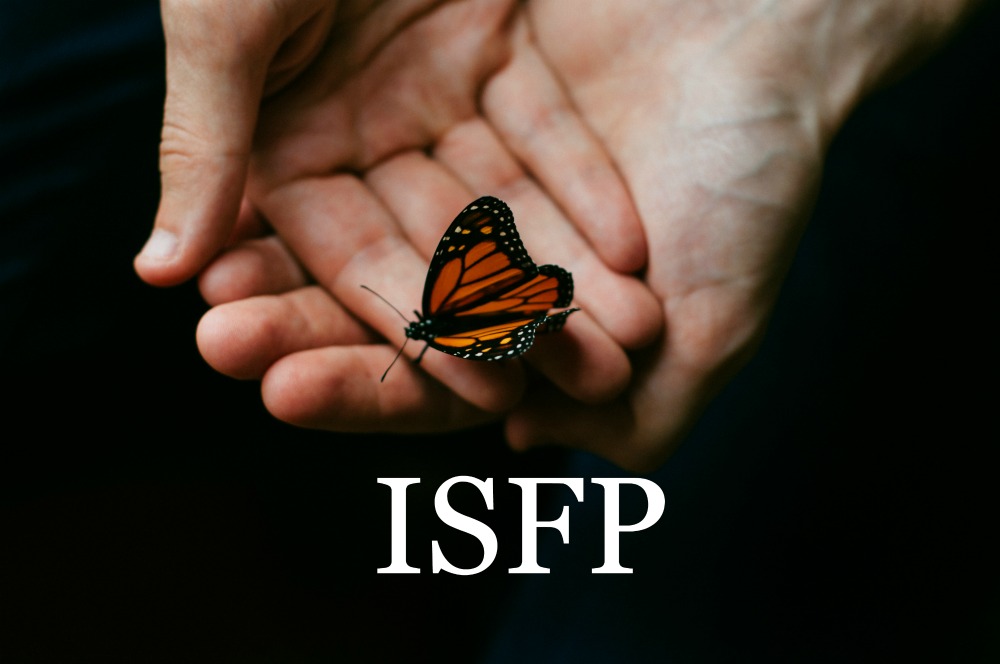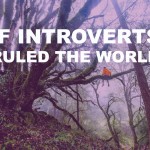The ISFP personality type, which makes up about 9% of the population, relates to the world through the senses. Their sensory approach to life drives their hobbies, career choices and relationships. But not in the way you might think.
The present moment is an ISFP’s happy place. Like true zen masters, ISFPs have been living in the Now since long before Eckhart Tolle made it cool. Though they may seem carefree and even self-indulgent at first glance, the ISFP personality type takes life very seriously. All of their exploits are driven by their deeper values. Their core beliefs are the winds that direct the sails of their decisions.
Unlike the more logical types, such as the ISTJ and INTJ, the ISFP is not interested in planning a secure future. Their main goal in life is to build identity in the here and now. They are creating a collage of experiences that align with their values. For the ISFP personality type, the beauty is in the process rather than the final product. And if there is one thing ISFPs know about, it’s beauty.
The ISFP eye for aesthetics
The ISFP personality type has a natural eye for aesthetics. They are the hands-on artists who transform everyday objects and spaces into a sensory delight. Whether their creation is in the form of visual art, music, or interior design, it is sure to titillate the senses. ISFPs also have a deep appreciation for the beauty of nature.
The ISFP personality type at work
The ISFP personality type will often choose a career that allows them to be creative and work with their hands. They might also choose jobs that afford them the freedom to focus on their personal pursuits. They are the adventure sport enthusiasts who moonlight as bartenders. Or the jazz singers who bookkeep during the day.
Some of the best jobs for ISFPs include:
– Interior designer
– Musician
– Carpenter
– Chef
– Cosmetologist
– Preschool teacher
– Florist
– Dental hygienist
– Fitness trainer
– Firefighter
ISFP Relationships
Like most introverts, ISFPs prefer quality over quantity in relationships. Loyal and committed, they value lifelong friendships. Though they are friendly, it’s difficult to befriend an ISFP who has already established his inner circle. If you are lucky enough to already be a member of an ISFP’s core clan, consider yourself privileged. She will stick by your side for better or worse.
An ISFP is highly perceptive of others. When they look at you, it might seem as if they are staring into your soul. Don’t worry, it’s only because they are. 😉
Their sensitive nature means that ISFPs are always considerate of the feelings of others. Since they hate conflict, ISFPs do their best to preserve harmony in their relationships. However, in the face of criticism, an ISFP may loose his or her temper.
The ISFP personality type tends to be service oriented in relationships. They prefer to “show” instead of “tell” when it comes to expressing their love. “Doers” to the core, ISFP lovers show their affection by doing nice things for you. Changing the oil on your car translates to “I love you”. An elaborately prepared meal means “I care”. ISFPs also show their love by being considerate of your needs. If you need space, they will gladly give it to you. They expect the same in return.
The ISFP need for space
The ISFP personality type is strongly independent. They need time alone to reflect. Solitude allows them to hold their experiences up to the light of their core values. Since the ISFP is the most experimental and adventurous of all the introverted types, they are often mistaken for extroverts. Those who don’t understand them will be confused by an ISFP’s sudden need to withdraw.
Don’t try to change them
ISFPs receive a lot of flack for the way they live their life. Others often nag them to be more practical, and focus on the future. If you know an ISFP, appreciate them for who they are. They are sensual artists who bring a lot of beauty to this world.
Here are some famous ISFPs you might have heard of:
Famous ISFPs
Avril Lavigne
Brad Pitt
Barbara Streisand
David Beckham
Brittany Spears
Lady Gaga
Jacqueline Kennedy Onassis
Ulysses S. Grant
Paul McCartney
Prince
What about you?
Are you an ISFP, or do you know one very well? I’d love to hear your thoughts and experiences related to the ISFP personality type.
Xo,













Another beautiful article Michaela! Wonderfully written! 🙂
Thanks Marko!
the points about being mistaken as carefree and self-indulgent, as well as an enjoyment of being creative are so true…..I think I need to do a few more creative things to get more balance in my life. I dont mind bieng mistaken for things that are similar to me, but being mistaken as the opposite of my character, is one of the more frustrating aspects of living in this kind of manner.
This is me! Just came across your website. I feel like it’ll be part of my daily routine now. Thanks Michaela.
You’re welcome, Anthony! So happy you found me! 🙂
Overall very close for me. Maybe the closest I’ve seen and I’ve seen a few. It a great gift to be seen clearly. Thank you!
My particular path to accessing beauty or opening the door when beauty knocks (beauty being one of “The” big three – Truth, Beauty, and Goodness) has been thur allowing space for endless constant refinement. As so freeingly paraphrased, allowing space for what the process provides rather than what the outcome of the process provides where so much of the world seems focused.
“Their main goal in life is to build identity in the here and now. They are creating a collage of experiences that align with their values.”
This points to something important that I’d like to play with to see if I can even more clearly see it.
“Their main goal in life is to build identity in the here and now.” Could be distilled to Goal=identity, now or Goal=identity. This for me depends on what you mean by identity.
I think, my current goal/focus/moving towards is daring to let go of the comfort/familiarity protection/insulation of identity. As
as Karlfried Gras von Durkheim so VERY boldly said in THE WAY OF TRANSFORMATION
The man who, being really on the Way, falls upon hard times
in the world will not, as a consequence, turn to that friend who
offers him refuge and comfort and encourages his OLD SELF to
survive. (Here OLD SELF means identity to me)
Rather, he will seek out someone who
(or build a life where those in his clan)
will faithfully and inexorably help him to risk himself, so that he may endure
the suffering and pass courageously through it, thus making of
it a ‘raft that leads to the far shore’. Only to the extent that man
exposes himself over and over again to annihilation, can that
which is indestructible arise within him. In this lies the dignity
of daring.
(or as you gently put it “…the ISFP is the most experimental and adventurous…”)
Thus, the aim of practice is not to develop an attitude
which allows a man to acquire a state of harmony and peace
wherein nothing can ever trouble him. On the contrary, practice
should teach him to let himself be assaulted, perturbed, moved,
insulted, broken and battered – that is to say it should enable him
to dare to let go his futile hankering after harmony, surcease from
pain, and a comfortable life in order that he may discover, in
doing battle with the forces that oppose him, that which awaits
him beyond the world of opposites.
(This guy doesn’t sound like a ISFP tho there is something to be gleaned from his passion and insight)
The first necessity is that we
should have the courage to face life, and to encounter all that
is most perilous in the world. When this is possible, meditation
itself becomes the means by which we accept and welcome the
demons which arise from the unconscious – a process very
different from the practice of concentration on some object as a
protection against such forces. Only if we venture repeatedly
through zones of annihilation can our contact with Divine Being,
which is beyond annihilation, become firm and stable. The more
a man learns wholeheartedly to confront the world that threatens
him with isolation, the more are the depths of the Ground of
Being revealed and the possibilities of new life and Becoming
opened.
Inspiring and shakes me profoundly.
I am an ISFP. I am timid yet friendly and can also disappear into the unknown when I choose to. I hate pressure, eventhough I know it’s good for me. I dislike any type of commitment that I haven’t come up with on my own, for I long to change my mind at any given moment. I agree whole heartedly that ISFP can come off as self centered at times, because that is exactly what I can be. If anything is not within my liking or in my comfort zone, or “I just don’t feel like doing it” I can easily dismiss people’s needs, especially if those people don’t respect my feelings. I am a paradox to myself. A bundled up mix of emotions and feelings, constantly at war with my internal struggle. I also lack the ability to word thugs correctly so much of the time. Even now, I can’t explain in word exactly what’s going on inside. I am a mystery to almost everyone who knows me. Even to my husband. 🙂 I love nature, animals, alone time. I have an easier time seeing the good in others than most, but if a person treats me like a door mat or is unkind too many times, I can write them off with ease, never really trusting them again, which is my way of protecting my own feelings. There is so much more I can say! I also have a hard time with those who are egotistic, especially if it is someone who is important to me. I want them to be humble when praised, and I do refuse to add to their ego in any way when I sense they are getting too full of themselves, and find myself reminding them in very subtle ways that what matters most is how we treat people, and who we are inside. I am disgusted by injustice. If I didn’t have such a firm grasp on what the Bible holds out for the future of mankind, I would most likely be a protester of some type. I am constantly concerned about the feelings of others. I want everyone to be understood and treated with respect and kindness. I am down to earth most of the time. I have many things I want to do and the inability to do them all. I can lose interest in things almost as soon as I find interest in them. I also have adult ADD, and it makes it hard for me to get out when I am in a funk. I maintain mostly a “acquaintance” relationship with people, because most relationships are a responsible that I just can’t “do.” Therefore, most of my closest friends are no-stress people who are the same as I am, or those who genuinely care for me and also give me my space and I with them.(ESFJ/ENFP/INFP/INFJ/INTJ) My husband is ENFJ and although he can be a bit pushy, he gives me he space I need and the freedom I need to be myself, while he gladly cares for our most important responsibilities, which he needs to do, for he is an ENFJ 😉 There is more to say, but that would take forever.
Kaley- Oh my gosh, I’m an ISFP too and I can relate to almost everything you said, like the “I just don’t feel like doing it” and dismissing other people’s needs (which I hated myself for sometimes as come to think of it it’s sort of self centered too). I also have difficulty verbalizing my feelings/ emotions in words as it seemed like so much is going on inside but words alone can’t justify it, or maybe a part of me just wanted to withhold part of that information to myself and not let others in completely and that’s a struggle. On one hand craving the intimacy with people but on the other preferred to imagine that in my head than dealing in actuality…I am a paradox to myself too.
Hi I agree. I am highly intuitive and am aware that its only perception. Only I find, regardless of what I know to be true (in this case assumption)…I am often proved right.
I find I think differently to most people and am often told that. Or that once you get to know me Iam not vague at all..great. It is frustrating at times. I enjoy transparency and the freedom to think differently although I dont get to share it often which is sad for me at times. Maybe I havent yet learnt to express myself well enough to be heard. My need for honesty is sometimes needy.
Yes..I know one of the ISFP and still love her a lot.
unfortunately I am an ESFJ and now we are strangers with some memories.
I am a isfp male.
Does it match with the esfj female or enfj female?
By the way, good article description. It’s very helpful and describe me overall.
Definitely me, although I took the MP test years ago and tested as something else then. It was one of the extroverts, and didn’t seem correct. I’ve always been confused about my sociability and ease with talking with people (especially strangers), while needing solitude at my core. Also of interest to me, now that I am retired after hating the office desk world all the years I was in it, are the jobs/careers in the list. I feel sad that I may have missed out on my true calling.
Thank you for the interesting information. I found it helpful.
I Love it! Its me to a T!